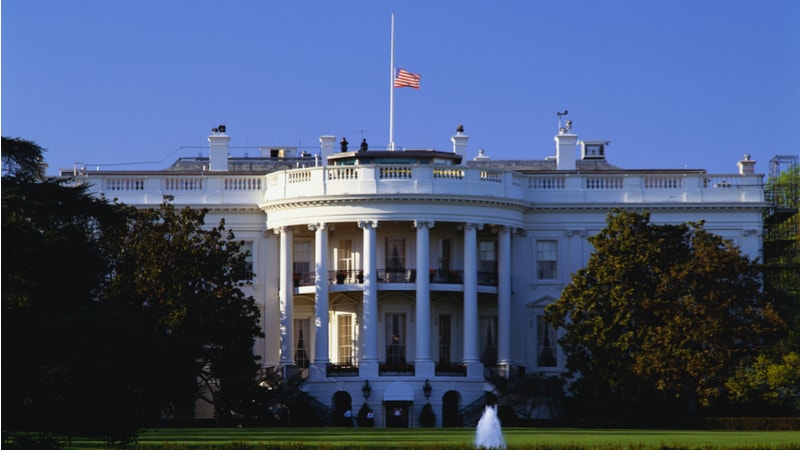
President Biden today issued an executive order (EO) that takes a broad swing at addressing risks and benefits of digital assets – including cryptocurrencies – and their underlying technologies and encourages Federal regulators to provide oversight of those assets to guard against systemic financial risks that they might impose.
The White House said the EO outlines the “first-ever, whole-of-government approach to addressing the risks and harnessing the potential benefits of digital assets” and the technologies that support them.
The order aims to take a closer look at digital assets from several viewpoints:
- Consumer and investor protection;
- Financial stability;
- Illicit finance;
- S. leadership in the global financial system and economic competitiveness;
- Financial inclusion; and
- Responsible innovation.
Policy Drivers
In issuing the order, the White House cited steep growth in the value of digital assets including cryptocurrencies, to a value of $3 trillion as of November 2021. The White House also said more than 100 countries are exploring or piloting “Central Bank Digital Currencies,” which are digital forms of sovereign currencies.
“The rise in digital assets creates an opportunity to reinforce American leadership in the global financial system and at the technological frontier, but also has substantial implications for consumer protection, financial stability, national security, and climate risk,” the White House said.
“The United States must maintain technological leadership in this rapidly growing space, supporting innovation while mitigating the risks for consumers, businesses, the broader financial system, and the climate,” it said. “And, it must play a leading role in international engagement and the global governance of digital assets consistent with democratic values and U.S. global competitiveness.”
The U.S. currently maintains taxation and other regulations that cover cryptocurrencies, but recent stirrings at the IRS and in the U.S. Senate indicate an appetite for a larger role for the government, particularly when it comes to preventing criminal uses of cryptocurrency.
In recent months, IRS Commissioner Charles Rettig told Sen. Maggie Hassan, D-N.H., in late that the IRS needs more money and changes to the tax code to better prevent and prosecute criminal uses of cryptocurrency, which has emerged in recent years as a favored medium of exchange involving ransomware and other cyber attacks.
Rettig’s Dec. 21 letter to Sen. Hassan responded to a query from the senator in September to the IRS and other Federal agencies to crack down on “current aspects of the cryptocurrency market that allow for criminal usage” of the virtual currency. The senator cited a 2021 cyberattack on the town of Peterborough, N.H., resulting in the theft of $2.3 million. The stolen funds, the senator said, were converted into cryptocurrency, “rendering it nearly impossible to recover.”
New Policy Exploration
The White House order contains little in the way of new, hard-and-fast policy rules, but directs Federal agencies to undertake the exploratory work that could lead to those kinds of changes.
Under the heading of consumer and investor protection, the order calls on the Treasury Department and other agencies to develop policy recommendations “to address the implications of the growing digital asset sector and changes in financial markets for consumers, investors, businesses, and equitable economic growth.”
In connection with that assessment, the order “encourages regulators to ensure sufficient oversight and safeguard against any systemic financial risks posed by digital assets.”
Regarding financial stability and systemic risk, the order asks the Treasury Department’s Financial Stability Oversight Council “to identify and mitigate economy-wide (i.e., systemic) financial risks posed by digital assets and to develop appropriate policy recommendations to address any regulatory gaps.”
Under the heading of illicit finance and national security risks, the order tasks numerous agencies with coordinating risk mitigation, and to work with “our allies and partners to ensure international frameworks, capabilities, and partnerships are aligned and responsive to risks.”
Regarding U.S. leadership in the global financial system, the order directs the Commerce Department “to work across the U.S. Government in establishing a framework to drive U.S. competitiveness and leadership in, and leveraging of digital asset technologies.” The resulting framework, the order says, “will serve as a foundation for agencies and integrate this as a priority into their policy, research and development, and operational approaches to digital assets.
Looking forward, the order says the government will take steps to “study and support technological advances in the responsible development, design, and implementation of digital asset systems while prioritizing privacy, security, combating illicit exploitation, and reducing negative climate impacts.”
Finally, the White House said the order encourages the Federal Reserve “to continue its research, development, and assessment efforts” for a U.S. Central Bank Digital Currency (CBDC) “including the development of a plan for broader U.S. Government action in support of their work.”
“This effort prioritizes U.S. participation in multi-country experimentation, and ensures U.S. leadership internationally to promote CBDC development that is consistent with U.S. priorities and democratic values,” the White House said. The order also calls for an assessment of “the technological infrastructure and capacity needs for a potential U.S. CBDC in a manner that protects Americans’ interests.
“President Biden’s EO on digital assets is an important step in furthering the adoption of cryptocurrency for consumers, enterprises, and businesses,” commented Nathan Jones, SVP and GM of Worldwide Public Sector Sales, Government Affairs, at TaxBit
“The EO’s balanced whole-of-government approach is setting the tone for the overall strategy of digital asset regulation, while legitimizing and bolstering the worldwide crypto ecosystem,” he said.
